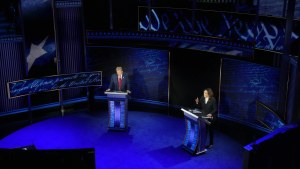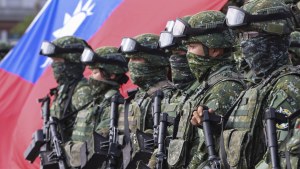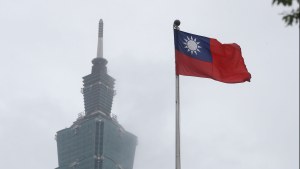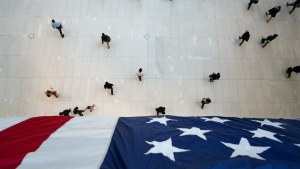Across party lines, however, opinion leaders oppose sending US troops to Taiwan to aid Taipei's defense should China invade.
As Donald Trump takes office for the second time, the future direction of US relations with China and Taiwan is tinged with an unusual degree of uncertainty. The president and his picks for top cabinet positions seem to hold different views about the US relationship with Taiwan, and about how important competition with China is as an element of US foreign policy. On the campaign trail, Trump claimed Taiwan “stole our chip business” and that Taipei “should pay us for defense.” By contrast, Trump’s secretary of state Marco Rubio is a China hawk and a longtime supporter of increased US-Taiwan ties. During the campaign, Rubio argued that a second Trump administration “would continue to support Taiwan.” During his Senate confirmation hearing in January, Rubio said the United States should help strengthen Taiwan’s defenses and called for rejecting any effort by China to “coerce” or “intimidate” Taiwan.
The 2024 Chicago Council-University of Texas survey of US foreign policy opinion leaders, conducted August 7–October 3, 2024, helps shed some light on how Republican opinion leaders more broadly view the US-Taiwan and US-China relationships. Republican foreign policy experts, like the Republican public, are far more likely than others to view China as a critical threat to the United States and more likely to say US-China trade weakens US national security. Leaders across party lines agree on how to handle a crisis over Taiwan: through providing humanitarian and military aid, but without deploying US troops to the island. But unlike the public, opinion leaders from both parties support using the US Navy to break a Chinese blockade of Taiwan, even at the risk of sparking a conflict with Beijing.
Key Findings
- Republican opinion leaders are significantly more likely than Democratic or Independent opinion leaders to view China’s territorial ambitions (80%) and economic competition from China (55%) as critical threats to the United States.
- Republicans among opinion leaders (76%) and the public (69%) view US-China trade as weakening US national security; Democratic and Independent leaders disagree.
- Across party lines, opinion leaders and the overall public oppose sending US troops to Taiwan to aid Taiwan’s defense should China invade.
- Bipartisan majorities of leaders, but not the public, support using the US Navy to break a Chinese blockade of Taiwan, even at the risk of triggering a direct conflict between the United States and China.
- Leaders and the public across party lines favor providing humanitarian and military aid to Taiwan and imposing economic and diplomatic sanctions on China in response to an invasion.
Republican Leaders Most Concerned about China’s Territorial Ambitions, Economic Competition
Republican opinion leaders are notably more concerned about China than are other opinion leaders. Eight in 10 (80%) view China’s territorial ambitions as a critical threat to the United States, compared to half of Independent (55%) and 46 percent of Democratic opinion leaders. And a majority of Republican leaders (55%) view economic competition from China as a critical threat, compared to just a third of Independents (32%) and a quarter of Democrats (25%). These divisions among leaders are mirrored among the public, with Republicans more concerned than other Americans, but to a lesser degree than among opinion leaders.
Republican Leaders, Public Say US-China Trade Weakens US National Security
Matching their greater level of perceived threat from Chinese ambitions and economic competition, Republicans are more concerned than other Americans about the national security implications of US-China trade. Majorities of Republican leaders (76%) and the Republican public (69%) say US-China trade does more to weaken US national security than it does to strengthen it. Republican leaders are out of step with Democratic (65%) and Independent leaders (58%), who tend to say US-China trade benefits US national security. However, Democratic and Independent opinion leaders are themselves out of step with their publics. A majority of Americans who identify as Independents (54%) view US-China trade as weakening US security. And Democrats among the public are about evenly divided on the question, with similar proportions viewing bilateral trade as strengthening (49%) and weakening (46%) US security.
Bipartisan Agreement in Flexible Approach to Dealing with China's Rise
Though leaders of differing political affiliations hold different views about the threat China poses and the security implications of US-China trade, leaders and the public across party lines agree on how the United States should deal with the rise of China’s power: in a flexible way. Majorities of all groups say the United States should undertake friendly cooperation when appropriate and actively limit China’s growth when appropriate. Some prefer a less-balanced approach: three in 10 Republicans among leaders and the public (30% each) prefer strictly focusing on limiting the growth of China’s power. And notably, not one Republican leader surveyed favored an approach of strictly seeking friendly cooperation and engagement with China.
Leaders, Public Split over US Response to Potential Taiwan Invasion
Perhaps the most volatile issue in US-China relations is the status of Taiwan. Though the United States does not recognize Taiwan as an independent country, Washington has maintained a robust yet unofficial relationship with Taipei since granting diplomatic recognition to the People’s Republic of China in 1979. That robust relationship has been supplemented by the US policy of “strategic ambiguity” in which Washington refuses to commit one way or another to the defense of Taiwan from a Chinese invasion.
Should such an invasion occur, majorities of leaders and the public, across party lines, support using the US military to airlift food and medical supplies to Taiwan, imposing economic and diplomatic sanctions on China, and sending additional arms and military supplies to Taipei. Leaders are broadly unified in their views on these policies, with nine in 10 or more in agreement across partisan lines. Majorities of the public agree, but the public is less unified in its positions, especially when it comes to sending arms and military supplies (59% favor). Leaders and the public are also united in opposition to sending US troops to Taiwan itself to aid Taipei in its defense against an invasion.
However, leaders and the public disagree about how to respond to a Chinese blockade of the island. Majorities of Republican (63%), Democratic (58%), and Independent (56%) opinion leaders favor using the US Navy to break a blockade of Taiwan even if it might trigger a direct conflict between the United States and China. By contrast, the American public opposes doing so.
How Leaders View Trump’s Election and US-Taiwan-China Policies
The inauguration of a second Trump administration raises the prospect of further changes in US policy toward Taiwan and China. When asked in fall 2024 about the impact of a Trump election on US-Taiwan issues, opinion leaders split along partisan lines. Republican leaders view Trump’s win as making a US-China war over Taiwan less likely (67%); a plurality (43%) also believe Trump makes US abandonment of Taiwan less likely (though a third, 34%, say it is now more likely). Democrats, by contrast, overwhelmingly believe that a Trump presidency makes abandonment of Taiwan more likely (92%). A plurality (42%) also believe it makes a war between the United States and China over Taiwan less likely, though a third (32%) believe it will have no effect on the likelihood of conflict.
Conclusion
As these survey results show, opinion leaders of different partisan affiliations disagree about what a Trump election means for Taiwan. But should a crisis arise, Republican and Democratic leaders generally agree on a forceful approach in response. These experts also generally agree on taking a flexible approach to US-China relations through a mix of cooperation and competition. Where Republicans diverge from Democrats on China, and where the new Republican administration (and Congress) may differ from a Democratic one, is in the intensity of the perceived threat and the perceived impact of US-China trade on US national security. Republican leaders’ greater concerns about both China’s security and economic ambitions suggest that while they may favor pursuing cooperation where appropriate, the scope of appropriate cooperation may be significantly narrower than in the past.
This analysis is based on data from two surveys designed by researchers in the Lester Crown Center on US Foreign Policy at the Chicago Council on Global Affairs.
Public data comes from the 2024 Chicago Council Survey of the American public on foreign policy. The survey was conducted June 21–July 1, 2024, by Ipsos using its large-scale nationwide online research panel, KnowledgePanel, in English and Spanish among a weighted national sample of 2,106 adults 18 or older living in all 50 US states and the District of Columbia. The margin of sampling error for the full sample is ±2.3 percentage points, including a design effect of 1.1229. The margin of error is higher for partisan subgroups (±4.2 points for Republicans, ±3.9 points for Democrats, and ±3.8 points for Independents) or for partial-sample items.
Opinion leaders data comes from the 2024 Chicago Council-University of Texas Survey of Foreign Policy Opinion Leaders. The opinion leaders survey was conducted by Verasight from August 7–October 3, 2024. The sample consists of 471 foreign policy leaders employed across a variety of sectors: executive branch agencies, Congress, academia, think tanks, the media, and interest groups (including nongovernmental organizations, religious institutions, labor unions, and business). The sampling frame was designed to replicate prior surveys of foreign policy opinion leaders conducted by the Chicago Council and the University of Texas from 2014 through 2022, which themselves aimed to replicate the original series of Chicago Council surveys of opinion leaders conducted between 1978 and 2004. The data is weighted equally by group size, replicating the approach taken in 2022.
In both surveys, partisan identification is based on how respondents answered a standard partisan self-identification question: “Generally speaking, do you think of yourself as a Republican, a Democrat, an Independent, or what?”
The 2024 Chicago Council Survey is made possible by the generous support of the Crown family, the Korea Foundation, and the United States-Japan Foundation. The 2024 Leaders Survey is made possible by the generous support of the LBJ School of Public Affairs at the University of Texas-Austin as well as the Strauss Center for International Security and Law and the Clements Center for National Security.








Related Content
 US Foreign Policy
US Foreign Policy
We investigate where the attitudes of foreign policy professionals and the American public align—and diverge—in a major election year.
 Public Opinion
Public Opinion
The Taiwanese public expects more US aid in a potential conflict with China than Americans are willing to endorse.
 Public Opinion
Public Opinion
But a majority oppose sending US troops if China were to invade the island.
 Public Opinion
Public Opinion
Results and analysis of the Council's annual survey of American views on foreign policy.
